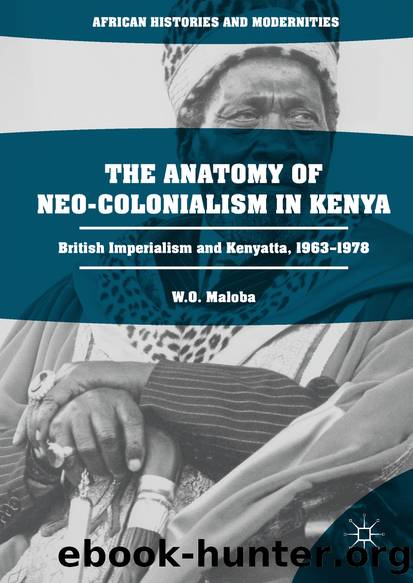The Anatomy of Neo-Colonialism in Kenya by W. O. Maloba

Author:W. O. Maloba
Language: eng
Format: epub
Publisher: Springer International Publishing, Cham
In this message, Kenyatta hinted at a parting of ways with Nkrumahâs call for immediate African unity. He was opposed to âterritorial expansionist aims which some Pan-African brothers wish to pursue.â If such radical reorganization of African territorial boundaries were pursued âin the Africa of today, we shall succeed only in starting a chain of reactions that would break up African solidarity and the shedding of blood.â To Kenyatta, soon to be Prime Minister of Kenya, pan Africanism meant, âbringing together into closer unions our various countries, so that the artificial boundaries created by imperialist powers between African brothers are declared contrary to the spirit of pan Africanism.â Lastly, Kenyatta supported the efforts of the United Nations Economic Commission for Africa (with Headquarters in Addis Ababa). He advanced the position that this Economic Commission (and related agencies) âcould be greatly utilized to interpret pan Africanism into its concrete form.â Thus, he was a great âsupporter of the steps being taken to create a united African Common Market, the harmonization of monetary zones in Africa, the co-ordination of economic development plans, so that Africa may move forward hand in hand in unity and in a spirit of brotherly fellowship.â179
Kenyattaâs hesitant position on, and later abandonment of, radical positions in international affairs was clearly evident in how his government handled the question of the liberation struggles against the racist regimes in southern Africa. In June 1964, Kenyatta delivered a long impassioned speech to a large charged crowd in Nairobi angry with the Boers in South Africa for jailing Nelson Mandela for his efforts to overthrow the apartheid regime. âIn front of 25,000 cheering people ⦠Mr. Kenyatta helped bury symbolic coffins of the South African Cabinet at a protest rally in Shauri Moyo, Nairobi.â Accompanied by some members of his new cabinet and diplomats from France, India, Pakistan, Yugoslavia, Ghana, China, and other countries, Kenyatta âurged the Governments of France, Britain, America and Germany to stop aiding South Africa.â Kenyans, he said, âmust be prepared to shed blood to help their âbrothersâ in South Africa, Southern Rhodesia and the Spanish and Portuguese colonies.â180 During this rally, Kenyatta also talked of Britainâs post-Uhuru aid to Kenya. Grants from Britain of about £60,000,000 âhad been made in return âfor sucking our bloodâ ⦠I talked to the British people who used to suck our blood and they have given us £60,000,000, I told the British people that they were sucking our blood and never given us anything in return. I am now telling them to give us something in return.â181 Kenyatta later retracted this statement. It was unsettling to the British. A few days after the rally, he issued a statement in which he âdenied that he had referred to the British as âblood suckersâ in his speech at the anti-apartheid rally ⦠The Prime Minister,â the statement continued, âwishes to make it clear that this is a distorted translation of a remark he made in Swahili which taken out of context is a
Download
This site does not store any files on its server. We only index and link to content provided by other sites. Please contact the content providers to delete copyright contents if any and email us, we'll remove relevant links or contents immediately.
| Africa | Americas |
| Arctic & Antarctica | Asia |
| Australia & Oceania | Europe |
| Middle East | Russia |
| United States | World |
| Ancient Civilizations | Military |
| Historical Study & Educational Resources |
The Dawn of Everything by David Graeber & David Wengrow(1698)
The Bomber Mafia by Malcolm Gladwell(1620)
Facing the Mountain by Daniel James Brown(1547)
Submerged Prehistory by Benjamin Jonathan; & Clive Bonsall & Catriona Pickard & Anders Fischer(1452)
Wandering in Strange Lands by Morgan Jerkins(1419)
Tip Top by Bill James(1409)
Driving While Brown: Sheriff Joe Arpaio Versus the Latino Resistance by Terry Greene Sterling & Jude Joffe-Block(1370)
Red Roulette : An Insider's Story of Wealth, Power, Corruption, and Vengeance in Today's China (9781982156176) by Shum Desmond(1353)
Evil Geniuses: The Unmaking of America: A Recent History by Kurt Andersen(1347)
The Way of Fire and Ice: The Living Tradition of Norse Paganism by Ryan Smith(1329)
American Kompromat by Craig Unger(1307)
It Was All a Lie by Stuart Stevens;(1296)
F*cking History by The Captain(1294)
American Dreams by Unknown(1277)
Treasure Islands: Tax Havens and the Men who Stole the World by Nicholas Shaxson(1267)
Evil Geniuses by Kurt Andersen(1250)
White House Inc. by Dan Alexander(1207)
The First Conspiracy by Brad Meltzer & Josh Mensch(1167)
The Fifteen Biggest Lies about the Economy: And Everything Else the Right Doesn't Want You to Know about Taxes, Jobs, and Corporate America by Joshua Holland(1118)
